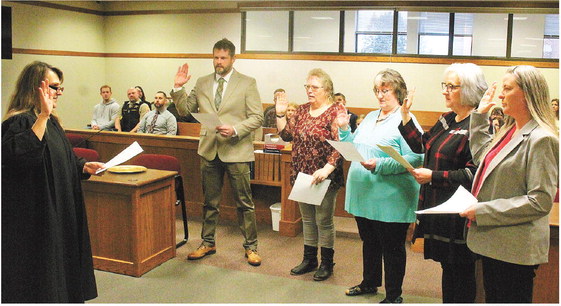She told committee members that ….
She told committee members that the total number of workers in her office was down by two full time positions since 2008.
Mildbrand noted that the move toward 40-hour weeks for staff members as a way to get more work without adding more bodies was proposed by the firm that works with the county for wage ratings as one of the outcomes of the wage study. Mildbrand said this was the second meeting in a row where a department came in and asked to increase hours and was concerned that the number would grow. He suggested that if the court staff was having trouble being prepared for court, they should look at having them come in earlier than when the courthouse opens on days when there would be court proceedings.
Knox-Bauer said coping with the growing workload is a continual problem and it is interfering with the functioning of the court. She said they are getting by, but that in the long run it is not feasible to continue this way. In addition, she noted that having 35-hour weeks is a hindrance to recruiting workers, noting they have had people turn down county jobs because with the five fewer hours a week it would amount to a reduction in income for them to come work for the county from their previous positions.
Knox-Bauer said the workload in her office will increase beginning in August as she takes over as the chief judge in the 9th circuit court district of the state.
Citing the inability of the county to generate additional revenue to cover wage increases, Lewis said counties were needing to look at which jobs are important and who can be terminated. He noted some counties in the state are giving pretty substantial raises with the knowledge that they can only keep them for this year and will be looking at cuts in the future.
“This is a very difficult decision. Everyone is working up to the maximum, but we don’t have the money,” Lewis said.
Lewis said they are getting to the point of needing to decide if they can afford to have that many employees. He said he wants the people who are working to make a viable living, but that services may need to be cut to make it happen. “I don’t think now is the time for staff increases,” he said.
Committee member Jim Gebauer disagreed and noted that the judge had the money in her budget to fund the hours through the end of the year. He supported going along with it now with no guarantee that it would continue further.
“Is there anything special about the next five months?” asked committee member Ray Soper.
Thums noted that she will be retiring from her position at the end of the year and that they have recently hired two staff members who are in the process of learning their positions. “When I leave it is 36 years of knowledge gone,” Thums said.
Authorization to hire
County board member Mike Bub wants the county to streamline the hiring process to shave off the need for full oversight committee approval to begin hiring to replace an existing position.
Currently, if a worker leaves a department, the department head must go to their oversight committee to fill the position. Bub noted that depending on timing of meetings this could add four to six weeks to the hiring process or that it could result in incurring costs of calling special committee meetings. He suggested the county could streamline things by having the committee chairmen given the ability to authorize the start of the hiring process. He said the full oversight committees would still have the ability to stop the process if they decided not to fill the position.
“I don’t think it is good to give one person on a committee that authority,” said committee chairman Chuck Zenner.
Lewis suggested that one way to streamline the system would be to hire an administrator. County administrators typically have the authority to hire and fire staff within the authorization limits set by the board.
Bub noted that in his time on the board he has never seen a request to fill an existing position turned down.
No action was taken on the request.
Overtime
The county continued to struggle with how to compensate exempt employees for working beyond 40 hours per week. Committee members were asked to support a policy change to clarify who can authorize exempt employees such as department heads to accrue compensatory time. Under the change, the department heads would have to get it OKed by the human resources director in order to receive comp time for work over 40 hours.
Mildbrand favored having the HR director approve this rather than the individual committee chairs because committee chairs would each have their own styles of what is OK and if one person was doing it, it would be more fair across the board.
Lewis disagreed saying it would add one more layer. Mildbrand said he felt it is important for the county to have a clear and concise policy. Zenner, noted that was again, where having a county administrator would be useful.
Highway commissioner Ben Stanfley raised the logistical concern noting that from the way his department worked and the needs of it, he used compensatory time often. “She doesn’t want me to contact her every time,” Stanfley said.
It was noted that exempt employees are paid a salary and are not eligible under labor rules for overtime. However county board member Lori Floyd noted that there is the possibility to grant “administrative time” to give additional time off when they have worked additional hours.
Committee member Rollie Thums said they need to trust their directors. “We need to treat our people like people,” he said, noting this is based on respect and trusting them.
In other business, committee members:
_ Formally set the budget increase goal for operations at 0% increase for the coming year. This has been the standard for the county in recent years as state levy limits constrain budget spending.
_ Approved the updated job description and to fill the children’s long-term support case manager position in human services. This is a fully funded position and would help relieve the backlog of 21 eligible children who are currently on a waitlist in the county. Mildbrand noted that while in the past he has been hesitant to vote yes, all the hours for this position are billable and it will address the waitlist for children in need of services. This does not change the overall authorization of the human services department to have up to 40 employees.
_ Approved an updated job description for the confidential human resources assistant for the human resource director with tweaks to the language in the job description from when it was reviewed last month.
_ Approved spending $99,500 of federal ARPA funds for the purchase and installation of radio repeaters for the highway department to improve communication. Because this falls under the $100,000 spending limit set by county code to require full county board action, it can be approved at the committee level. This will leave the county with about $179,500 left undesignated in ARPA funds.
_ Approved taking the settlement for opioid settlement as a lump sum amount rather than being paid out over 18 years. The county will get slightly less in the total amount this way, but will be protected from the risk of the court changing the settlement in the future. Brandl explained these funds are from the settlement with the manufacturers of opioids and there are ongoing cases against the distributors. He noted the money is designated for opioid treatment with limited ways in which to spend it.
_ Approved purchasing a van for the commission on aging using grant funds. The van will be used at the Gilman Senior Center. In other vehicle action, the committee delayed acting on replacing a human services vehicle which was damaged in a crash until the county hears back from the other party’s insurance company.



